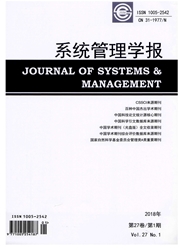

 中文摘要:
中文摘要:
应用隐马尔科夫模型,基于Baum—welch算法建模、Viterbi算法解码和Matlab仿真方法,以山东临沂地区的87家果蔬加工企业为案例,研究了企业可追溯体系投资决策意愿的形成过程与主要影响因素。研究显示,与人的心理特征相类似,果蔬企业可追溯体系的投资决策意愿具有多种状态,决策是一个由多种因素交织影响的复杂过程。研究表明:净收益预期、政府的食品安全监管力度与支持政策以及国际市场需求,食品安全质量认证体系与信息化水平和企业管理者年龄特征等是影响投资决策的主要因素;而垂直一体化程度与行业风险特征、企业管理学历特征对于果蔬产业供应链比较短的行业并非主要影响因素。
 英文摘要:
英文摘要:
In this paper, we try to study the intention of 87 fruit and vegetable processing firms of Feng County, Jiangsu Province on investment in food tracing systems and the main factors by HMM (Hidden Markov Model), based on modeling with Baum-Welch algorithm and obtain the optimal path by Matlab simulation with Viterbi decoding algorithm. The results show that, like the personal psychology, the intention of fruit and vegetable processing firms on investment in tracing system are different and affected by variety of factors. The main factors affect the investment intention are the expectation of net income, government's regulation and supporting policies on food safety, demand of international market, the level of firm's quality certification system and information communications, and managers' age. However, the main factors that affect the investment intention of short food supply chain are not the level of degree of integration, characters of industrial risks, and managers' education level.
 同期刊论文项目
同期刊论文项目
 同项目期刊论文
同项目期刊论文
 Factors Affecting Consumer Willingness to Pay for Certified Traceable Food in Jiangsu Province of Ch
Factors Affecting Consumer Willingness to Pay for Certified Traceable Food in Jiangsu Province of Ch 期刊信息
期刊信息
